In their own voices, alumnae share thoughts and advice on women's paths to the bench.
By Lori Nelson.
The College of Law has a long and storied history of outstanding female graduates. Rebecca Garelick was the first female student, graduating and joining the Utah Bar Association in 1924. Three women had graduated by the end of the 1920s. Reva Bosone, who graduated in 1930, went on to be the first woman elected to the bench in Utah—and in 1948, she became the first woman from Utah to be elected to Congress.
Since then, the law school has had many female graduates take the bench. We’ve asked some of them about their experiences, and here’s what they shared.
My journey to the bench
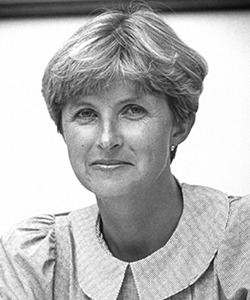 Judge Pamela Greenwood ’72 graduated from the S.J. Quinney College of Law in 1972. She was a member of the Utah Law Review and followed her graduation by teaching as an associate professor at the college from 1972 to 1977. Greenwood left her faculty position to work as a civil litigator. After becoming counsel to the Utah State Bar, she served as the first female president of both the Salt Lake County Bar and the Utah State Bar. Greenwood was appointed to the Utah Court of Appeals at its formation in 1987, leaving the bench for retirement in 2009.
Judge Pamela Greenwood ’72 graduated from the S.J. Quinney College of Law in 1972. She was a member of the Utah Law Review and followed her graduation by teaching as an associate professor at the college from 1972 to 1977. Greenwood left her faculty position to work as a civil litigator. After becoming counsel to the Utah State Bar, she served as the first female president of both the Salt Lake County Bar and the Utah State Bar. Greenwood was appointed to the Utah Court of Appeals at its formation in 1987, leaving the bench for retirement in 2009.
"I obtained my law degree from the S.J. Quinney College of Law in 1972. During law school, I was one of three or four women in my class. I passed the bar exam and became one of the less than a dozen women lawyers in Utah at that time.
Finding a job was challenging, to say the least, although my law school record was as good or better than many of my male classmates who were successful in obtaining good legal employment. Probably my most pivotal experience was when I became the first bar counsel for the Utah State Bar. In that capacity I met and worked with several lawyers who were state bar commissioners and/or in leadership positions with the bar.
My bar volunteer activities impressed on me the value of a good sense of humor, pragmatism, and willingness to listen carefully to others and help negotiate realistic solutions."
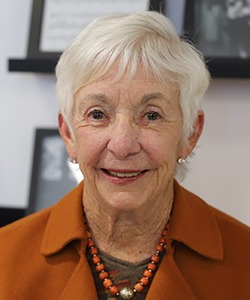 Judge Judith Billings, ‘77 was also appointed to the Utah Court of Appeals at its formation in 1987, and remained on the bench there until 2008. Prior to that, Billings was a district court judge in the Third Judicial District of Utah. Before joining the bench, Billings worked as a trial lawyer focused on commercial litigation. During her judicial career she served as chair of the Appellate Judges Conference of the American Bar Association, as well as President of the National Association of Women Judges. She has also taught judicial process at the college as an adjunct professor.
Judge Judith Billings, ‘77 was also appointed to the Utah Court of Appeals at its formation in 1987, and remained on the bench there until 2008. Prior to that, Billings was a district court judge in the Third Judicial District of Utah. Before joining the bench, Billings worked as a trial lawyer focused on commercial litigation. During her judicial career she served as chair of the Appellate Judges Conference of the American Bar Association, as well as President of the National Association of Women Judges. She has also taught judicial process at the college as an adjunct professor.
"I was introduced to the land of law when my first husband died and I was required to work closely with our lawyers at Ray Quinney and Nebeker to settle his estate and sell his business. I had previously worked as a high school teacher in Philadelphia while my husband went to business school to get an MBA. After he died, I needed to find work, and I applied for and was admitted to the University Of Utah Law School.
I loved law school and ultimately joined Ray Quinney and Nebeker as its second woman and only female litigator. When the Utah Court of Appeals was created, my family and friends encouraged me to apply—and I was appointed to my best job ever."
On being a woman on the bench
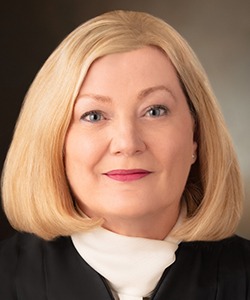 Judge Carolyn McHugh, ’82, joined the 10th Circuit Court of Appeals in 2014 after acting as the presiding judge of the Utah Court of Appeals. While part of Utah’s judiciary, McHugh served on the Commission on Civics and Character Education, the Judicial Conduct Commission, and the United States Department of Justice’s Advanced Science and Technology Adjudication Resource Center.
Judge Carolyn McHugh, ’82, joined the 10th Circuit Court of Appeals in 2014 after acting as the presiding judge of the Utah Court of Appeals. While part of Utah’s judiciary, McHugh served on the Commission on Civics and Character Education, the Judicial Conduct Commission, and the United States Department of Justice’s Advanced Science and Technology Adjudication Resource Center.
"When I started practicing law in 1982, being a female lawyer was still a novelty. Some senior lawyers refused to work with female associates, and many refused to travel or lunch with a woman lawyer. Some legal secretaries were willing to work only for a male boss. And there were judges who called us “honey” and “sweetheart,” and clients who would not allow a woman to serve as lead counsel on their matters.
Practicing law is hard enough without adding these hurdles, so I hope most of that novelty has passed with the admission of so many talented women to the profession. I wish I had then known, but have since learned, that one’s work speaks for itself. Success is defined by you, not by anyone else."
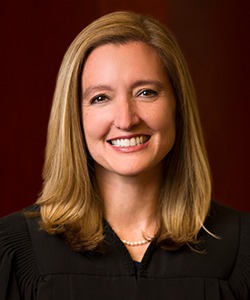 Judge Jill M. Pohlman, ’96, was appointed to the Utah Court of Appeals in 2016 by Governor Gary Herbert. She is currently the court’s associate presiding judge and sits on the Supreme Court’s Advisory Committee on the Rules of Appellate Procedure, the Judicial Council’s Committee on Judicial Outreach, and the Utah State Bar Litigation Section Executive Committee.
Judge Jill M. Pohlman, ’96, was appointed to the Utah Court of Appeals in 2016 by Governor Gary Herbert. She is currently the court’s associate presiding judge and sits on the Supreme Court’s Advisory Committee on the Rules of Appellate Procedure, the Judicial Council’s Committee on Judicial Outreach, and the Utah State Bar Litigation Section Executive Committee.
"There were times early in my career where opposing counsel gave me a hard time because I was a young woman. I recall one attorney who made things so difficult that I started thinking maybe I should find another line of work. I wish I would have realized early on that hard work and success would neutralize those experiences, and that they would be the exception, not the rule. I am so fortunate to have had mentors who encouraged me to lean into the opportunities I was given. If I had waited until I felt 100% ready, I would have missed out on so much."
Alumna Spotlight:
Judge Shauna Graves-Robertson
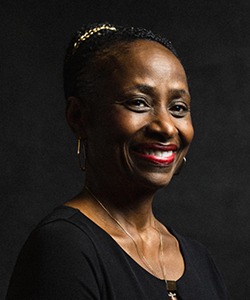
Judge Shauna Graves-Robertson, ’90, has been honored with the Distinguished Leader Award at the 2021 Living Color Gala, hosted by Living Color Utah and Utah Business Magazine. Graves-Robertson is the only African American woman to sit on the bench in Utah.
Graves-Robertson graduated with a B.S. in criminal justice from Arizona State University. She served in many capacities in the criminal justice arena, working as a program specialist for the Office of Standards and Evaluations in the Utah Division of Youth Corrections, and as a treatment counselor serving delinquent youth.
Graves-Robertson was appointed by Governor Scott M. Matheson to head the State of Utah’s Office of Black Affairs. While serving in that capacity, she worked with community leaders and organizations to promote economic development throughout minority communities. She then earned her Master of Public Administration from the University of Utah. She worked as a law clerk for the Utah Attorney General’s Office, and one year later, earned her J.D. degree from the S.J. Quinney College of Law.
As an attorney, Judge Graves-Robertson practiced in the areas of criminal defense and family and employment law. She has worked with Utah Legal Defenders Association and Innovations International, Inc., where she trained the members of major corporations in diversity and empowerment. In 1999, Graves-Robertson was appointed to the Salt Lake County Justice Court, where she is the presiding judge.
Graves-Robertson has served on the boards of the Alberta Henry Foundation and Youth and Families with Promise. She is also a member of the National Bar Association, the Minority Bar Association, the National Association of Women Lawyers, and the American Bar Association.
“I love the fact that no matter why a person is appearing in front of me, I can impact them in a positive way,” says Graves-Robertson in a feature in Utah Business magazine. “I want to see the landscape of this state actually show the differences we claim to support.”
My advice to recent alumnae
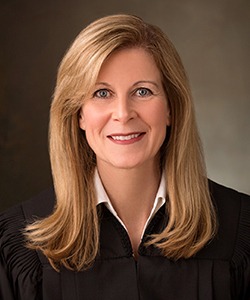 Judge Linda Jones, ’89, practiced civil and criminal law for 28 years before being appointed to the Third District Court bench by Governor Gary R. Herbert in 2017. Jones has also served as an adjunct professor at the college, teaching appellate advocacy.
Judge Linda Jones, ’89, practiced civil and criminal law for 28 years before being appointed to the Third District Court bench by Governor Gary R. Herbert in 2017. Jones has also served as an adjunct professor at the college, teaching appellate advocacy.
"When I began my journey in the law, I was fortunate to have giants in the community as mentors—Brooke Wells, Noel Hyde, Pam Greenwood, and Sam Alba, to name a few.
My early mentors were great teachers. But the law lends itself to great teaching moments. I am learning new perspectives and areas of the law all the time from bright lawyers in their first hearings.
Mentors and mentees should take advantage of mentoring moments at every level. Mentors help hone skills and foster talent; they make connections, and they can talk through the issues in a case and provide support and lasting friendships. As we navigate a pandemic world, we need the emotional and professional support of friends and mentors now more than ever."
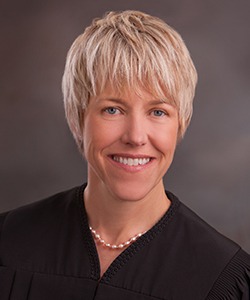 Judge Elizabeth Hruby-Mills, ’93, earned her master’s degree in counseling from the University of Vermont in 1986. She worked as an emergency services social worker and counselor for children before attending law school—a perspective that has aided her work.
Judge Elizabeth Hruby-Mills, ’93, earned her master’s degree in counseling from the University of Vermont in 1986. She worked as an emergency services social worker and counselor for children before attending law school—a perspective that has aided her work.
"Being on the bench is a fascinating learning experience every day. I remain amazed at the variety of issues that come before me. Every day is a challenge—and with COVID, there are even more challenges.
I encourage attorneys to be active in their communities. We are fortunate to have skills and education that can be of service to so many. Serve on boards, volunteer with legal aid, run with Girls on the Run. Be active with the bar, and Women Lawyers, and alumni associations. The contacts and relationships you make, and the service you provide, help balance out some of the stress of being an attorney. Also, it is so important to address wellness concerns: Be active and healthy, and ask for help when you need it."
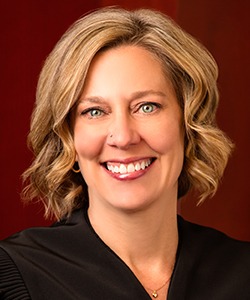 Judge Michele Christiansen-Forster, ’95, was appointed to the Utah Court of Appeals in 2010 and is currently the court’s presiding judge. Before joining the appellate bench, she was a trial judge in the Third Judicial District Court. Christiansen-Forster’s judicial career was preceded by her work as general counsel for Governor Jon Huntsman, Jr., as an assistant United States attorney, and as an associate at Parsons Behle & Latimer.
Judge Michele Christiansen-Forster, ’95, was appointed to the Utah Court of Appeals in 2010 and is currently the court’s presiding judge. Before joining the appellate bench, she was a trial judge in the Third Judicial District Court. Christiansen-Forster’s judicial career was preceded by her work as general counsel for Governor Jon Huntsman, Jr., as an assistant United States attorney, and as an associate at Parsons Behle & Latimer.
"I wish I had known early on how important it is to be my own advocate—that waiting for someone else to recognize and acknowledge my good work meant a long wait. It seems that we women lawyers have a hard time promoting ourselves and insisting that we be part of the narrative—we don't want to come across as arrogant.
Be brave enough to express your opinions, promote your skills and knowledge, take appropriate credit for your good work, and loudly acknowledge your successes and wins. And be willing to do the same for the other women in the room."
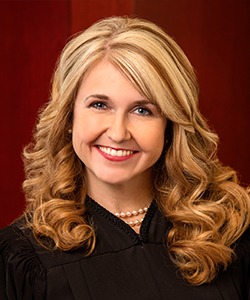 Judge Diana Hagen, ’98, was appointed to the Utah Court of Appeals in 2017. Prior to taking the bench she was the first assistant at the office of the United States Attorney for the District of Utah, after acting as the appellate chief. She worked at Parr Brown Gee & Loveless in the appellate section after clerking for U.S. District Judge Tena Campbell.
Judge Diana Hagen, ’98, was appointed to the Utah Court of Appeals in 2017. Prior to taking the bench she was the first assistant at the office of the United States Attorney for the District of Utah, after acting as the appellate chief. She worked at Parr Brown Gee & Loveless in the appellate section after clerking for U.S. District Judge Tena Campbell.
"I’ve learned that I don’t have to look or act a certain way to be taken seriously. If I like to wear pretty pink outfits and high heels, that’s okay. If I’m naturally bubbly and smiling, that’s okay, too. I have the luxury to be myself thanks to women lawyers before me who had to overcome gender stereotypes to prove their worth in a male-dominated profession. Because of them, I can let the quality of my work speak for itself.
Don’t let it bother you when people dismiss or underestimate you based on your gender, age or appearance. Being disarming can work to your advantage. People who make those kinds of assumptions will be blindsided when they find out how capable you really are."
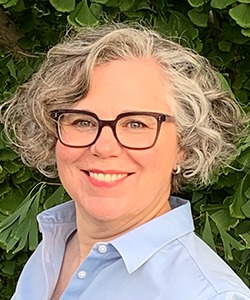 Judge Rita Cornish, ’06, was appointed to the Second District Court in 2020, serving Davis, Morgan and Weber Counties. Cornish clerked for Judge Carolyn McHugh ’82, and then joined Parr Brown Gee & Loveless, where she maintained a complex civil litigation practice.
Judge Rita Cornish, ’06, was appointed to the Second District Court in 2020, serving Davis, Morgan and Weber Counties. Cornish clerked for Judge Carolyn McHugh ’82, and then joined Parr Brown Gee & Loveless, where she maintained a complex civil litigation practice.
"When I first started practicing, I wish I would have trusted more in the willingness of my colleagues, both male and female, to be sponsors and mentors. Over the course of my career, I was reluctant to impose on others’ limited time and resources to ask for professional help or guidance. But I failed to realize that a mentor-mentee relationship is not a unidirectional exchange of value. It is not just the mentee that benefits from the relationship; the mentor gets something out of the deal too.
There is incredible value in the sense of connection with a mentee, fresh insights they can offer, opportunities for self-reflection, and the sense of pride in a mentee’s accomplishments. Trust that the person you are asking for support will get something of value from the interaction as well."
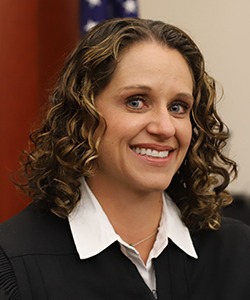 Judge Monica Diaz, ’08, taught grade school before earning her J.D. After graduating, Diaz prosecuted delinquency cases in juvenile court and served as a defense attorney for Utah Juvenile Defender Attorneys. Prior to joining the bench in 2021, she was director of the Utah Sentencing Commission.
Judge Monica Diaz, ’08, taught grade school before earning her J.D. After graduating, Diaz prosecuted delinquency cases in juvenile court and served as a defense attorney for Utah Juvenile Defender Attorneys. Prior to joining the bench in 2021, she was director of the Utah Sentencing Commission.
"Being on the bench has been the greatest honor and privilege. However, it is also the hardest job I’ve ever had. Looking back, it was easy being a practitioner and arguing for a specific outcome. It is very difficult being on the other side of the bench and making decisions that will likely change someone’s life.
The weight I feel not only comes from the decisions I have to make, but also from being a Hispanic woman on the bench. I want to make women and my Hispanic community proud. I strongly believe it is imperative that Black, indigenous, and other youth of color see individuals like them represented in all walks of life. Growing up, rarely did I see someone who looked like me in a position of power. While I had plenty of worthy role models in my life, it was rare for any of them to be of multiracial heritage like myself.
We have made considerable progress, but representation continues to be a struggle. For example, only about 25 percent of Utah’s judiciary are women, and even fewer are individuals of color. I hope that a young person can look at me, see someone who resembles them, and think, “if she can do it, I can do it.”